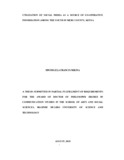| dc.description.abstract | This study sought to examine the utilization of social media as a communication tool by co-operatives in Meru County in the dissemination of co-operative information among the youth. The researcher explored the potential of social media and examined its usage and barriers as a communication tool among the co-operatives. Largely, the study notes that the growth and usage of social media has been enabled by the internet and technological advancement. This thesis aimed at finding out the extent to which the co-operatives in Meru County use social media as a communication tool in enhancing the uptake of their services among the youth. The objectives of this study were to assess the communication tools used by the co-operatives in Meru County, to ascertain the extent to which social media is being used as a communication tool in enhancing the uptake of co-operative services and to ascertain barriers to usage of Social media as a communication tool by co-operatives. This study used positivist paradigm, which is based on facts and considers the world to be external and objective. The study was conducted in Meru County in Kenya using mixed methods. Both qualitative and quantitative data was used. The data collected was integrated in the design analysis by explaining and building it within the large data framework. The study explored the technological determinism theory and the social construction of technology theory to underpin and encapsulate how technological culture can shape the future of the co-operative movement. In this study the researcher interviewed key informants in the co-operative movement. The study found out that 83% of co-operatives under study utilized social media as a source of co-operative information. However, only few youths are members of co-operatives. From this study, co-operatives in Meru County were found to have huge ICT and communications gaps and risk to follow economies all across Africa being faced with low-paid, informal work, and youth unemployment. To address this gap, social media as a communication tool, offers one of the best solutions in line with the sector’s principles. Co-operatives need to explore how digital platforms, rooted in the principles of broad-based ownership and democratic governance, could come to fruition across co-operatives in the county focusing on their potential and feasibility, global and local contexts, case studies and success stories, openness and transparency, policy and sustainability; this will further set co-operatives to radically prepare the social organization of emerging technologies among themselves aiming to re-design with community wealth in mind. This study strongly tasks co-operative and communication scholars to link radical democracy and the internet as a tool for corporate extraction, and how to reverse the process while harnessing the dividends of social media as a communication tool among co-operatives. | en_US |

